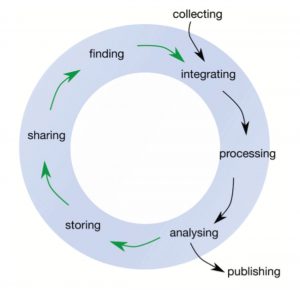Opinion: Best practice data life cycle approaches for the life sciences (F1000 Res)
 Producing data is costly, and with advances in technology, we are producing data with revolutionary capacity. However, we are also losing data at an astonishing rate, with around 80% of data being unavailable 20 years after publication. Griffin et al. provide guidelines, repositories and other resources that can be used by scientists to deposit and document their data. The reasons to deposit data and code in open source repositories are altruistic as well as selfish, as data shared according to FAIR principles boost citation indices and ensure eligibility for funding. The authors stress the importance of including training on effective data sharing in the curriculum, ensuring data are FAIR in the future and extending data lifespans. (Summary by Magdalena Julkowska) F1000 Res. 10.12688/f1000research.12344.2
Producing data is costly, and with advances in technology, we are producing data with revolutionary capacity. However, we are also losing data at an astonishing rate, with around 80% of data being unavailable 20 years after publication. Griffin et al. provide guidelines, repositories and other resources that can be used by scientists to deposit and document their data. The reasons to deposit data and code in open source repositories are altruistic as well as selfish, as data shared according to FAIR principles boost citation indices and ensure eligibility for funding. The authors stress the importance of including training on effective data sharing in the curriculum, ensuring data are FAIR in the future and extending data lifespans. (Summary by Magdalena Julkowska) F1000 Res. 10.12688/f1000research.12344.2



